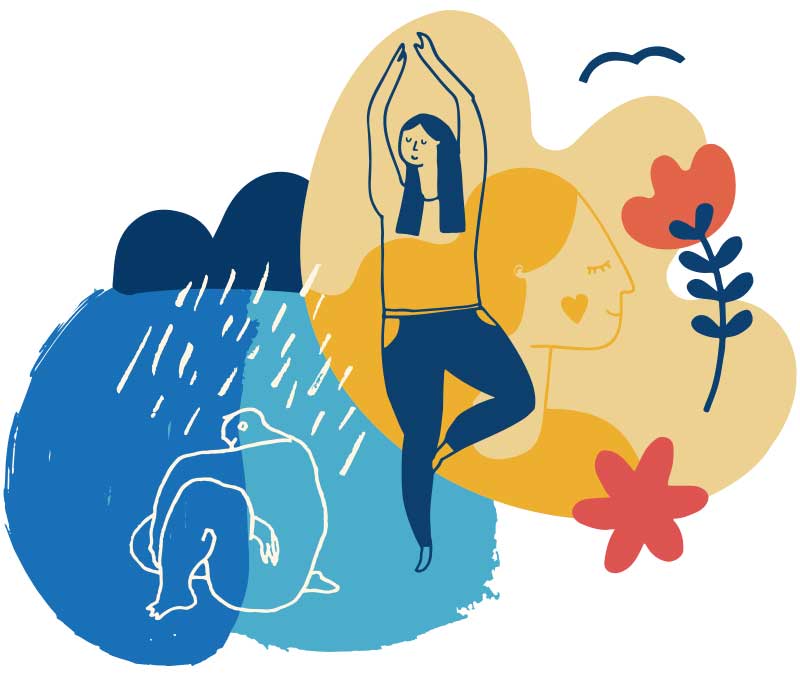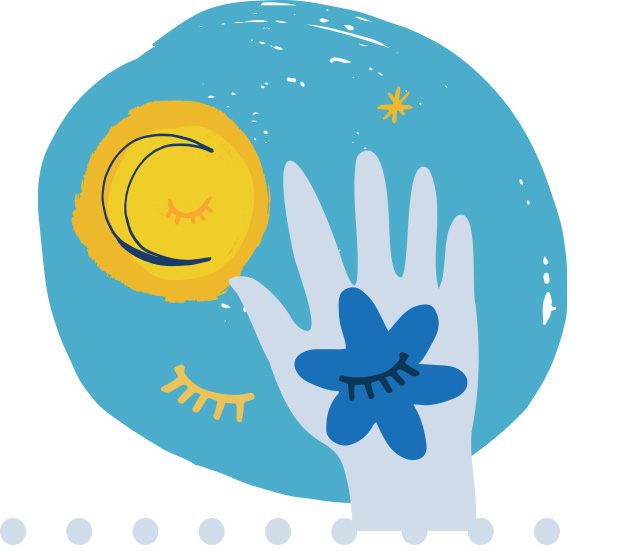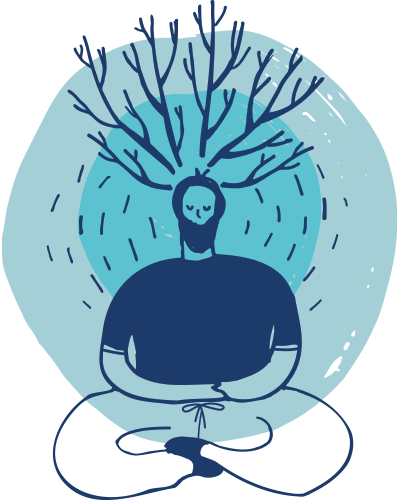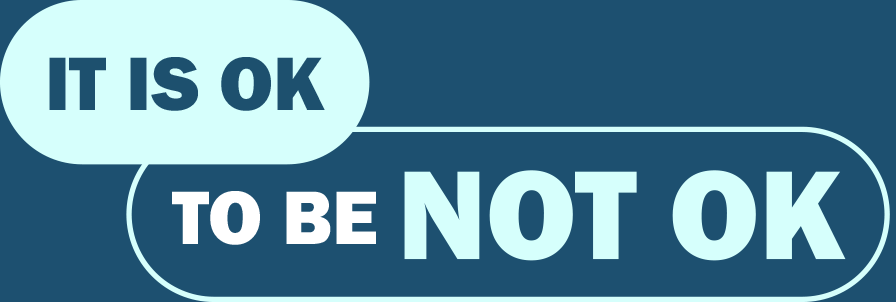The Impact of the Pandemic on Well-Being
Sadness, fear, worry, and other emotions can affect us during or after tough situations. Examples of tough situations include the COVID-19 pandemic, loss of a family member or friend, or experiences related to racism. Dealing with these issues can weigh heavily on your mental health and affect your daily life.
Quick Facts:
- One in five American adults has a mental health condition.
- 21 million Americans have depression.
- Anxiety is the most common mental health disorder in the U.S. It affects 40 million people.
- Suicide accounts for 41,000 deaths annually in the U.S. It is the 10th leading cause of death.
- The rate of mental health disorders doubles for those who have been to war or lived through a disaster, including the pandemic.
Many people are experiencing grief during the pandemic. Grief is a normal response to loss. Grief can happen in response to loss of life, as well as to drastic changes in daily routines and ways of life that usually bring us comfort.
If you are feeling stress, grief, or anxiety during this time, you are not alone.
It is natural to feel stress, anxiety, grief, and worry during challenging times. However, feeling strong emotions or being stressed for extended periods of time can have negative effects on your health. Learning to cope in a healthy way will help you, the people you care about, and those around you become more resilient. You can help yourself, others, and your community by sharing the information in this handbook.
Remember: You are not alone. It is OK to be not OK. There are resources available to help.

Quick Self-Check
Do you have mild symptoms that have lasted for LESS THAN two weeks?
- Feeling a little sad or down
- Feeling down but still able to work, take care of yourself, and family
- Trouble sleeping
- Feeling irritable and moody
If so, these are some self-care activities that can help:
- Exercising
- Engaging socially with others
- Sleeping on a regular schedule
- Eating healthy
- Sharing with a trusted friend or family member
- Practicing meditation, relaxation, and mindfulness
If these symptoms do not improve or seem to be worse after two weeks of self-care activities, then you may need to talk to your health care provider.
Do you have severe symptoms lasting MORE THAN two weeks and that are interfering with daily life?
- Not sleeping
- Appetite changes resulting in unwanted loss of weight or weight gain
- Struggling to get out of bed in the mornings because of mood
- Not able to concentrate or make decisions
- Loss of interest in things you normally enjoy
- Unable to perform daily functions and activities
- Thoughts of death or self-harm
Contact your doctor or a mental health professional if these are problems you are facing. You can also find resources below and throughout this site.
Need Support Now?
If you or someone you know is struggling or in a crisis, help is available. Call or text 988 or chat at 988lifeline.org.

Mental and Emotional Well-Being
It is time to talk about this pandemic and how it has created stress and distress for you, your family, and your co-workers. Mental and emotional health is just as important as physical health. Good mental and emotional health increase happiness and resilience.
Understanding Mental Health
Your mental health is how you feel in your heart and mind. It is always changing. One day you might be happy and another day you might be sad. Most of us experience mental health challenges. It is normal. Sometimes, they are more severe and can affect emotions and how you think and act. It is important to know when you need help to maintain good mental and emotional health. It is OK to be not OK. It is also OK to ask for help and to offer help to others who are having mental and emotional health challenges.
Mental Well-Being vs. Mental Illness
 Identify Your Symptoms
Identify Your Symptoms
Instructions: Below are some signs and symptoms that COVID-19 may have stressed you during this pandemic. Think about each symptom you have felt, or that you are feeling now.
- Feeling on edge
- Exhaustion
- Not wanting to make decisions
- Difficulty sleeping
- Lack of satisfaction or enjoyment with work
- Feeling disconnected from co-workers, customers, or patients
- Anger and irritability
- Not feeling sympathy or empathy
- Increased use of alcohol or drugs
Experiencing life-threatening or traumatic events impacts everyone differently. It is important to know about stress-related symptoms that can cause problems with your mental well-being, compassion fatigue, and burnout from your job.
 Disaster-Related Distress
Disaster-Related Distress
Experiencing life-threatening or traumatic events impacts everyone differently. It is important to know about stress-related symptoms that can cause problems with your mental well-being, compassion fatigue, and burnout from your job.
Instructions:
Here are some signs and symptoms of disaster-related distress. Think about each symptom. Did you feel any during the pandemic? Are you feeling any now?
Physical Signs and Symptoms of Disaster-Related Distress
- Stomach aches or diarrhea
- Changes in eating habits
- Headaches or other pains with no clear cause
- Jumpiness or edginess
- Trouble falling asleep, staying asleep, sleeping too much, or trouble sleeping
Cognitive Signs and Symptoms of Disaster-Related Distress
- Difficulty remembering things
- Difficulty thinking clearly or concentrating
- Confusion
- Trouble making decisions
Emotional Signs and Symptoms of Disaster-Related Distress
- Anxiety and fear
- Overwhelming sadness
- Anger
- Guilt
- Numbness and inability to feel joy or sadness
Behavioral Signs and Symptoms of Disaster-Related Distress
- Increase or decrease in activity levels and reduced stamina
- Frequent crying
- Use of alcohol or drugs to escape feelings
- Angry outbursts
- Desire to be alone most of the time and self-isolation
- Risk-taking behavior

Identifying and Handling Stress and Anxiety
Life is stressful. However, we must learn to cope. Not managing stress or anxiety can result in more serious mental health issues.
The Differences Between Stress and Anxiety
Both stress and anxiety can affect mental and physical well-being. You may experience symptoms such as:
- Excessive worry
- Forgetfulness
- Tension
- Headache
- Body pain
- High blood pressure
- Loss of sleep
Recognize what causes your stress. Common stressors are:
- Money or job issues
- Health or illness
- A sick family member or a sick friend
- Marriage or divorce
- Birth of a child
- Moving
Both stress and anxiety can affect mental and physical well-being. You may experience symptoms such as:
- Excessive worry
- Forgetfulness
- Tension
- Headache
- Body pain
- High blood pressure
- Loss of sleep
How to Feel Better in 5 Minutes:
- Put down your phone.
- Stretch and breathe deeply.
- Take a quick walk outside.
- Write down how you feel.
Recognize what causes your stress. Common stressors are:
- Money or job issues
- Health or illness
- A sick family member or friend
- Marriage or divorce
- Birth of a child
- Moving
Boosting Well-Being to Cope with Stress and Anxiety
Doing small things every day can help you cope and have a positive impact on your mental and emotional well-being. Here are some ways to practice self-care:
Boosting Well-Being to Cope with Stress and Anxiety
Doing small things every day can help you cope and have a positive impact on your mental and emotional well-being. Here are some ways to practice self-care:
 Coping With Stress
Coping With Stress
Instructions:
Here is a list of healthy ways to cope with stress. Acknowledge any of the recommendations you currently follow. Think about ways to do some of the items you are not doing now.
- Take breaks from news stories, including on social media. It is good to be informed, but constant discouraging information can be upsetting.
- Stay up to date on your COVID-19 vaccines.
- Eat fruits and vegetables, lean proteins, whole grains, and fat-free or low-fat dairy products. Limit saturated fats, cholesterol, salt, and added sugars.
- Go to bed at the same time each night and get up at the same time each morning, including on weekends. This can improve your sleep.
- Move more and sit less. Every bit of activity helps.
- Take deep breaths, stretch, or meditate.
- Limit alcohol intake.
- Avoid using prescription drugs in ways other than prescribed. Do not take someone else’s prescription or use illegal drugs.
- Avoid smoking and the use of tobacco products.
- Continue with regular health appointments.

Identifying and Coping with Depression
Depression is a mood disorder that affects how you feel, think, and behave. It can lead to a variety of emotional and physical problems. Depression is more than “the blues.” It is not a weakness, and it will not simply go away.
Symptoms of Depression
Symptoms of depression that last longer than two weeks need to be discussed with your doctor. Most people who have depression start to feel better with medication, therapy, or both. Symptoms of depression include:
- Thoughts of hurting yourself
- Fatigue
- Trouble concentrating
- Feelings of guilt and worthlessness
- Loss of interest in things that bring joy
- Not being able to sleep
- Irritability
- Overeating or loss of appetite
Symptoms of depression that last longer than two weeks need to be discussed with your doctor. Most people who have depression start to feel better with medication, therapy, or both. Symptoms of depression include:
- Thoughts of hurting yourself
- Fatigue
- Trouble concentrating
- Feelings of guilt and worthlessness
- Loss of interest in things that bring joy
- Not being able to sleep
- Irritability
- Overeating or loss of appetite
 Depressed Thoughts
Depressed Thoughts
Instructions:
Here is a list of common thoughts and feelings associated with depression. Acknowledge each of the thoughts and feelings you have had.
- I am terribly lonely all the time, even when I’m with friends and loved ones.
- I am exhausted all the time.
- I have an overwhelming sense of sadness about life.
- Just getting through the day feels like torture.
- I feel like I will never be happy again, even though I know that is not true.
- I feel misunderstood and ashamed.
- I feel like everything is hopeless.
- All I want to do is go home, curl up, and fall asleep forever.
What You Can Do About Depression
- Tell your medical doctor. Depression can last for years if left untreated. There are treatments available to help you cope with depression.
- Set realistic goals. Set priorities. Break things down into small tasks and tackle them one at a time.
- Try to be with other people. Talk to someone.
- Let your family and friends help you.
- Participate in activities that make you feel better, like exercise, church, movies, sports, and social activities.
- Do not make important decisions until your depression is lifted.
- It may take a while to get your first appointment with a mental health professional. Do not despair. Once you are a patient, appointments will be easier to make.
Coping Skills
Coping skills are activities you can use to reduce difficult thoughts. These skills can also help you to move forward when you are having tough times. Everyone is different, so not all skills work for everyone. It is important to give a few different coping skills a try. Find what works for you. Do not forget to use these skills when you are overly stressed.
Did You Know?
- Drinking water and staying hydrated are important for focus and emotional stability.
- Bananas, nuts, and oily fish (like salmon) are foods that can help keep you mentally well.
- Being grateful can boost your feelings of well-being.
- Vitamin D from sunlight helps your body produce serotonin, which affects your mood.
- Helping others can help you feel better.
- Walking for just 30 minutes per day can boost your mood.
 Useful Coping Skills
Useful Coping Skills
Instructions:
Here is a list of activities that may help you cope with stress and anxiety. Consider each of the activities you have tried. Then think of new ones to add to the mix.
- Call or visit friends or loved ones
- Take a nap, a bath, or a hot shower
- Listen to music, dance, and/or sing
- Cook, garden, or do yard work
- Recite daily devotionals or pray
- Write in my journal
- Watch a funny video or read something funny
- Take a walk, stretch, or play a game or sport
- List the things I am grateful for and that bring me joy
- Make plans for the future and/or make a to-do list
- Take deep breaths, visualize a peaceful place, and/or meditate
“In the Moment” Coping Skills for a Personal Time Out
Quick things to do when you are stressed out, upset, hurt or about to “blow up”:
- Slow in and out breathing
- Count backward from 20
- Give yourself a hug
- Tell yourself that your thoughts are just thoughts
- Tensing and relaxing
- Grounding: Name 5 things you can see, hear, and feel
- Self-talk (“I can handle this”)
- Snap a rubber band on your wrist
- Think about something funny
- Imagine a positive scene
- Spider push-ups (put fingers on one hand against fingers on the other and push in and out)
Deep Breathing
Deep breathing is a way to relax by purposefully taking slow, deep breaths. When practiced often, deep breathing exercises provide instant and long-term relief from stress and anxiety.
Square Breathing
- Breathe slowly through your nose while counting to four.
- Hold your breath and count to four.
- Exhale slowly while counting to four.
- Hold your breath and count to four.
- Repeat.
Belly Breathing
- Place your hands on your belly.
- Take a deep breath, focusing on your belly expanding.
- Hold your breath for a count of three.
- Slowly exhale and repeat.

Journaling
Using a journal can help you to see your feelings on paper. It can help you to describe how you feel. You can use a notebook or computer to write down your thoughts and feelings. You can keep these notes to look back on or share with others. You can also write them down and tear them up or delete them.
It does not matter what you do with them because the important part is to release your thoughts and feelings and help you better understand yourself.
Journaling can be calming and clearing for your mind. It is a terrific way to release pent-up stress.
Tips for Journaling
- Use a notebook, pen, or computer.
- Keep your journal in your special place.
- Be open and honest.
- Write about upsetting emotional experiences.
- Write about positive things in your life.
- If you are spiritual, write down your prayers.
10 Journaling Prompts to Get You Started
- How do I feel today?
- How do I want to feel today?
- What do I need the most?
- What is my biggest lesson or achievement today? This week? This month?
- The things that bring me joy are…
- I feel happiest when…
- How can I have more joy, happiness, and peace in my life?
- What changes do I need to make to feel healthier, happier, and more fulfilled?
- I want to forgive…
- The main cause of stress in my life is…

Blessings Jar
Find a jar with a top. Decorate it if you like. Whenever you recognize something that is a “blessing” in your life, write it down on a piece of paper, fold it up, and stick it in the jar. Dump the jar out and read your blessings before you start the new year. Look in your blessing jar throughout the year if you need a prompt for journaling. Simply pull out a blessing and write about it.
“In the Moment” Coping Skills for a Personal Time Out
Quick things to do when you are stressed out, upset, hurt or about to “blow up”:
- Slow in and out breathing
- Count backward from 20
- Give yourself a hug
- Tell yourself that your thoughts are just thoughts
- Tensing and relaxing
- Grounding: Name 5 things you can see, hear, and feel
- Self-talk (“I can handle this”)
- Snap a rubber band on your wrist
- Think about something funny
- Imagine a positive scene
- Spider push-ups (put fingers on one hand against fingers on the other and push in and out)
Deep Breathing
Deep breathing is a way to relax by purposefully taking slow, deep breaths. When practiced often, deep breathing exercises provide instant and long-term relief from stress and anxiety.
Square Breathing
- Breathe slowly through your nose while counting to four.
- Hold your breath and count to four.
- Exhale slowly while counting to four.
- Hold your breath and count to four.
- Repeat.
Belly Breathing
- Place your hands on your belly.
- Take a deep breath, focusing on your belly expanding.
- Hold your breath for a count of three.
- Slowly exhale and repeat.

Journaling
Using a journal can help you to see your feelings on paper. It can help you to describe how you feel. You can use a notebook or computer to write down your thoughts and feelings. You can keep these notes to look back on or share with others. You can also write them down and tear them up or delete them.
It does not matter what you do with them because the important part is to release your thoughts and feelings and help you better understand yourself.
Journaling can be calming and clearing for your mind. It is a terrific way to release pent-up stress.
Tips for Journaling
- Use a notebook, pen, or computer.
- Keep your journal in your special place.
- Be open and honest.
- Write about upsetting emotional experiences.
- Write about positive things in your life.
- If you are spiritual, write down your prayers.
10 Journaling Prompts to Get You Started
- How do I feel today?
- How do I want to feel today?
- What do I need the most?
- What is my biggest lesson or achievement today? This week? This month?
- The things that bring me joy are…
- I feel happiest when…
- How can I have more joy, happiness, and peace in my life?
- What changes do I need to make to feel healthier, happier, and more fulfilled?
- I want to forgive…
- The main cause of stress in my life is…
Blessings Jar
Find a jar with a top. Decorate it if you like. Whenever you recognize something that is a “blessing” in your life, write it down on a piece of paper, fold it up, and stick it in the jar. Dump the jar out and read your blessings before you start the new year. Look in your blessing jar throughout the year if you need a prompt for journaling. Simply pull out a blessing and write about it.

Improve Well-Being Through Self-Care
Self-care activities are things you do to maintain good health and improve your well-being. Taking care of yourself helps you with your job, family, and supporting others who may need help.
Types of Self-Care
 My Daily Self-Care
My Daily Self-Care
Look at the table below. On the left, you will see common feelings of distress. On the right, you will see coping skills to help you deal with difficult feelings. Think about other coping skills that you can use to help you in the future.
| If you feel… | Try… |
|---|---|
| Overwhelmed | Taking a step back |
| Stressed | Focusing on relaxing |
| Anxious | Practicing a coping skill |
| Sad | Being loving to yourself |
| Angry | Breathing deeply and relaxing |
| Drained | Resting and recharging |
| Broken | Finding the positive in yourself |
| Upset | Taking time for yourself |
| Alone | Reaching out for support |
Asking for Help
Everyone knows the African proverb: “It takes a village to raise a child.” It takes an entire village of people to support each of us on this life journey. We do not mind asking for help when our bodies are sick. It is equally important to ask for help when our mind is stressed and we are emotionally exhausted. Know who the people are in your “village” so you can help each other.
It is important to share when you feel that your mental and emotional health are challenged. Talking can help us to understand our emotions and to see things in a different way. It is important to know that you are not alone. Your trusted village can help you. Talking helps other people to help us.
Who To Talk To?
When thinking about asking for help, ask yourself – “Do I really need to do this alone?”
Think about who you might want to talk to. Think about the people in your life who you can trust and the people to whom you are closest. A family member, a friend, or spiritual advisor are common sources of support. Sometimes it is easier to talk to people you do not know, like a professional counselor.

 Define Your Village
Define Your Village
Instructions:
Identify five people you can turn to when you are feeling overwhelmed, anxious, or sad. Make a list of their names in your head or write them down.
 Identify Your Needs
Identify Your Needs
Use the prompts to help you identify some areas where support would benefit you.
- Situations I need help with are…
- Ways I can ask for help are…
- Things to say when I need help include…
Talking to Spiritual Advisors
Many people feel the need to seek spiritual guidance when they are stressed. If your inclination is to hand over your problems to a higher power, this may be the perfect support outlet for you. No, a priest, minister, or church counselor cannot physically take away your anxiety or solve your problems. Yet, they can guide you to a path of peace and strength through spirituality.
Spiritual wellness is taking time to determine your purpose in life and understanding your personal impact on the rest of the world. You can find your own spiritual wellness through prayer, quiet time, and meditation.
Talking to Your Health Care Provider
Do not wait for your doctor to bring up your mental and emotional health. Take this opportunity to talk to your doctor if you are feeling anxious, depressed, or even overwhelmed. They can help by referring you to a mental health specialist.
Prepare ahead of your visit. Your health care provider has limited time to talk to you. Think of your questions and concerns beforehand and write them down. Take a list of your medications and include anything you take over the counter. Let your doctor know if there are any family mental health issues.
Bring a friend or family member. Sometimes it is helpful to have someone with you, especially if you are not feeling well. They can take notes and remember what your doctor said. They may also be able to offer some insight on how they think you are doing.
Be honest. Your health care provider can only help you with what you tell them. It is a private conversation that is confidential and cannot be shared with anyone without your permission. Describe all your symptoms and when they started. Examples of symptoms include:
- Sadness, anxiousness, and moodiness
- Hopelessness
- Feeling guilty, worthless, or helpless
- Loss of interest in things you enjoy
- Decreased energy and tiredness
- Difficulty sleeping
- Appetite or weight changes
- Unexplained aches, pains, headaches, or digestive problems
- Thoughts of death or suicide

Ask questions. There is no “one size fits all” treatment. You may have to try different things to find what works best for you. Remember to ask questions and be honest.
What to Say to a Friend Who Is Struggling Mentally and Emotionally
We all go through tough times. You can help a friend by letting them talk and express their feelings. It might provide comfort to give an example of a time you or someone you know struggled and needed support. Validate what they are saying. Respect their trust and do not share what they have told you without permission.
You can feel better. Let them know that reaching out and talking is the first step to feeling better. Let them know that there is hope and mental health problems are treatable.
It is OK to ask for help. Remember that our past, cultures, and experiences have an impact on how we seek help. Some people come from families or cultures who view asking for help or seeking mental health counseling as shameful or weak. Thinking about why your friend might not want help can be important in helping them find support. Ask how you can best help them.
Listen closely to what they are saying and respond with compassion. Try:
- “That must be so hard.”
- “I am sorry you are going through this.”
- “It is normal to have these feelings right now.”
Did You Know?
- Staying hydrated improves mental wellness
- Dehydration can impact brain function.
- Drinking 6-8 glasses of water per day is recommended.
- 73% of your brain is water.
- Signs of dehydrating include dry skin, sleeplessness, dry mouth, headaches, irritability, and thirst.

Information Specific to Men
Men and women both experience depression but their symptoms can be very different. Additionally, men are less likely to talk about, and seek treatment for depression. Read on for information specific to men experiencing anxiety and depression.
Did You Know?
- Six million American men experience depression each year.
- Men are four times more likely than women to die of suicide.
- Men may be more likely to use drugs or alcohol as a means of coping with mental health issues.
- Work stress and a lack of social support have been linked to a higher likelihood of mental health issues in men.
- Men are less likely to seek help for depression, substance abuse, and stressful life events. This is due to social and cultural norms, difficulty talking about problems, and downplaying symptoms.
- One in ten American men suffer from rage.
- Mental health issues have a greater impact on men’s physical health.
- “Real men” DO ask for help!
How to “CENTER” Mental Health for Men
Four Habits of Mentally Healthy Men
- Healthy Body: Eat well, exercise, reduce alcohol
- Healthy Lifestyle: Balance work and social time
- Healthy Mindset: Set goals, reprogram negative thoughts
- Healthy Connections: Focus on strengthening positive relationships with others

Did You Know?
- Six million American men experience depression each year.
- Men are four times more likely than women to die of suicide.
- Men may be more likely to use drugs or alcohol as a means of coping with mental health issues.
- Work stress and a lack of social support have been linked to a higher likelihood of mental health issues in men.
- Men are less likely to seek help for depression, substance abuse, and stressful life events. This is due to social and cultural norms, difficulty talking about problems, and downplaying symptoms.
- One in ten American men suffer from rage.
- Mental health issues have a greater impact on men’s physical health.
- “Real men” DO ask for help!
How to “CENTER” Mental Health for Men
Four Habits of Mentally Healthy Men
- Healthy Body: Eat well, exercise, reduce alcohol
- Healthy Lifestyle: Balance work and social time
- Healthy Mindset: Set goals, reprogram negative thoughts
- Healthy Connections: Focus on strengthening positive relationships with others


Resources for Support
Seek professional help when something disrupts your life daily and continues for a couple of weeks or longer. This may include thoughts of harming yourself or others.
211
211 helps you to gain access to all community resources.
- Dial 2-1-1 or text 888-421-1266.
- Chat online at 211connectsalabama.org.
988 Mental Health and Suicide Lifeline
988 is available 24 hours a day, nationwide. It is staffed by trained crisis counselors for individuals experiencing a mental health, substance abuse, or suicide crisis. Your call is confidential.
If you or someone you know is experiencing a mental or emotional health crisis, call or text 988 or chat at 988lifeline.org.
Aging and Disability Resource Centers
For older individuals, individuals with disabilities, and their caregivers. Access Medicare and Medicaid assistance, crisis support, prescription drug assistance, caregiver assistance, and a screening for all programs and services.
- 1-800-AGE-LINE (1-800-243-5463)
Connect Alabama App
Behavioral health services and treatment finder that provides individuals with access to education, information, and services related to substance abuse, mental health, and prevention.
The app is available for download on iOS through the App Store and for Android devices via Google Play.
The Emotional PPE Project
Connects health care workers in need with licensed mental health professionals who can help. No cost. No insurance needed. Just a trained professional to talk to.
Mental Health America
Find educational resources and self-screen for a variety of mental and emotional wellness conditions.
National Alliance on Mental Illness
- nami.org and namialabama.org
- Call the helpline at 1-800-950-6264 or text “helpline” to 62640
- Alabama Crisis Line: 1-800-273-8255
Veterans Crisis Line
- Call 1-800-273-8255 and Press 1
- Chat online: veteranscrisisline.net/get-help-now/chat
Text 838255
Wings Across Alabama
Staffed by Certified Peer Specialists who have personal experience with mental illness, including stigma, feeling overwhelmed, loneliness, thoughts of suicide, challenges of poverty, and more.
Call to have a confidential conversation with someone who will listen without judgment or criticism.
- 1-844-999-4647
- wingsacrossal.org
Only call 911 for:
- Medical emergencies
- Crimes is in progress
- Vehicle collisions
- Fires
- When you or someone you care for feels at risk of danger



